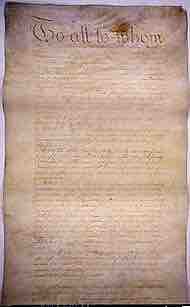The Articles of Confederation were established in 1777 by the Second Continental Congress . The Articles accomplished certain things, but without a good leader, they were bad. First, they expressly provided that the states were sovereign. (A sovereign state is a state that is both self-governing and independent. ) The United States as a Confederation was much like the present-day European Union. Each member was able to make its own laws; the entire Union was merely for the purposes of common defense.The reason for the independence of the colonies is clear--the colonies were afraid of the power of a central government such as the one in the State of Great Britain. The Articles provided that a Congress, consisting of two to seven members per state, would hold legislative power. The states, regardless of the number of Congress members representing them, each had one total vote. The Congress was empowered to settle boundary and other disputes between states. It could also establish courts with jurisdiction overseas. Also, it could tax the states, even though it did not possess the power to require the collection of these taxes by law.

Articles of Confederation
These articles outlined the new government of the United States.
The Congress, overall, was absolutely ineffectual. The Congress had to rely on the states for its funding. Since it could not forcibly collect taxes, the states could grant or withhold money and force Congress to accept their demands. Because it could not collect taxes, Congress printed paper dollars. This policy, however, absolutely wrecked the economy because of an overabundance of paper dollars, which had lost almost all value. Several states also printed their own currency. This led to much confusion relating to exchange rates and trade; some states accepted the currency of others, while other states refused to honor bills issued by their counterparts. Furthermore, the Articles included certain fallacies. For instance, it suggested that the approval of nine states was required to make certain laws. However, it made no provision for additional states. Thus, it would appear that the number nine would be in effect even if that number would actually be a minority of states. Also, the Articles required the approval of all states for certain important decisions such as making Amendments. As the number of States would grow, securing this approval would become more and more difficult.